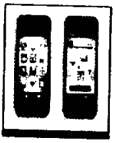题型:填空题 题类:模拟题 难易度:普通
what,look like,straight,or,tall,may be |
Dear Tina,
Steve is my cousin.{#blank#}1{#/blank#}is he like?Mm,he is friendly.He{#blank#}2{#/blank#}my uncle.He has short{#blank#}3{#/blank#}hair.He's not short and not{#blank#}4{#/blank#}.Is he eleven{#blank#}5{#/blank#}twelve?Oh!I forget it.He{#blank#}6{#/blank#}eleven years old.Well,I'll ask my uncle and then I'll tell you.Now I want to tell you Steve is going to your school on Monday.Please be friendly to him,OK?
Yours,
Bob
将下列单词或词组填入空格,每空格限填一词,每个单词或词组只能填一次。
A. widely B. suffer C. health D.thinner E. complain of |
With such a large rise on mobile phone users around the world over the last 10 years, many people are worried about {#blank#}1{#/blank#} possible problems. For some time, scientists have been thinking that mobile phones could lead to cancer.But so far,there is no strong evidence (证据)for this.
The Norway Institute of Public Health and the UK 's Health Protection Agency both released some studies last year.They said that there was no link found between mobile phone radiation(辐射) and cancer.
However, many mobile phone users often {#blank#}2{#/blank#} headaches, dizziness (头晕)and even feeling sick.Last October,a court case (诉讼案件)in Italy said that heavy mobile phone usage had caused brain cancer in one man.
He had used a mobile phone up to six hours a day for 12 years.
But the biggest problem with research now is that it is too early to reach conclusions.Mobile phones have only been {#blank#}3{#/blank#} used since the 1990s, and cancers can take many years to develop.
There is also still a strong argument that mobile phones are a major risk for children."Inner child,small central brain structures are going to be exposed(暴露),"said Dr.Annie,"Besides,kids have a skell(头盖骨) which is {#blank#}4{#/blank#}.
There is much more water in their brain, so there are many reasons that they take in more of the same radiation."

试题篮